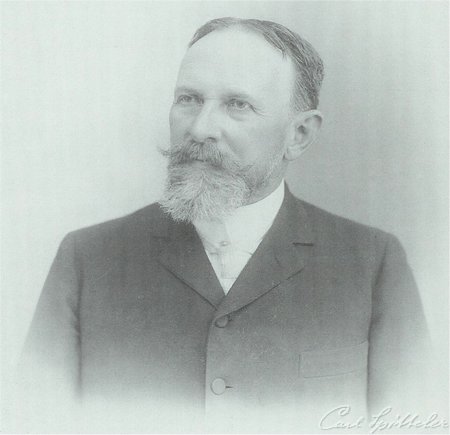- Carl Spitteler
Infobox Writer
name = Carl Friedrich Georg Spitteler
awards = awd|Nobel Prize in Literature |1919

imagesize = 200px
birthdate = birth date|1845|4|24|mf=y
birthplace =
deathdate = death date and age|1924|12|29|1845|4|24|mf=y
deathplace =
occupation = poet
nationality = SwissCarl Friedrich Georg Spitteler (
April 24 ,1845 —December 29 ,1924 ) was a Swiss poet who was awarded theNobel Prize for Literature in 1919. His work includes both pessimistic and heroical poems.Spitteler was born in
Liestal , and from 1863 he studied law at theUniversity of Zurich . In 1865-1870 he studied theology in the same institution, atHeidelberg andBasel . Later he worked inRussia as tutor, starting from August 1871, remaining there (with some periods inFinland ) until 1879. Later he was elementary teacher inBern andLa Neuveville , as well as journalist for the "Der Kunstwart" and as editor for the "Neue Zürcher Zeitung".In 1881 Spitteler published the alegoric prose poem "Prometheus and Epimetheus", published under the pseudonym Carl Felix Tandem, and showing contrasts between ideals and dogmas through the two mythological figures of the titles; later he reworked it and published it under his true name, with the title "Prometheus der Dulder" ("Prometheus the Sufferer", 1924). This work later influenced
Carl Gustav Jung 's theories explained in his "Psychological Types". In 1883 he married Marie op der Hoff, previously his pupil in Neuveville.In 1900-1905 Spitteler wrote the powerful alegoric-epic poem, in
iambic hexameter s, "Olympischer Frühling" ("Olympic Spring"). This work, mixing fantastic, naturalistic, religions and mythological themes, deals with human concern towards universe. His prose works include "Die Mädchenfeinde "("Two Little Misogynists", 1907), about his autobiographical childhood experiences, the dramatic "Conrad der Leutnant "(1898), in which he show influence from the previously opposed Naturalism, and the autobiographical novella "Imago" (1906), examining the role of unconscious in the conflict between a creative mind and the middle-class restrictions.During
World War I he opposed to the pro-German attitude of the Swiss German-speaking majority, a position put forward in the essay "Unser Schweizer Standpunkt". In 1919 he won the Nobel Prize. Spitteler died atLucerne in 1924.Works
*"Prometheus und Epimetheus" (1881)
*"Extramundana " (1883, seven cosmic myths)
*"Schmetterlinge" ("Butterflies", 1889)
*"Der Parlamentär" (1889)
*"Literarische Gleichnisse "(“Literary Parables”, 1892)
*"Gustav" (1892)
*"Balladen "(1896)
*"Conrad der Leutnant "(1898)
*"Lachende Wahrheiten "(1898, essays)
*"Der olympische Frühling" (1900-1905, revised 1910)
*"Glockenlieder "(“Grass and Bell Songs", 1906)
*"Imago" (1906, novel)
*"Die Mädchenfeinde "(" Two Little Misogynists", 1907)
*"Meine frühesten Erlebnisse "(“My Earliest Experiences", 1914, biographical)
*"Prometheus der Dulder" (“Prometheus the Suffering”, 1924)External links
* [http://literature.nobel.brainparad.com/carl_spitteler.html Carl Spitteler] at the [http://literature.nobel.brainparad.com/index.html Timeline of Nobel Winners]
* [http://www.angelfire.com/ego2/olko/cgi-bin/spitteler-autobio.html Autobiographical sketch]
* [http://www.carl-spitteler.ch Official Site of the Carl Spitteler Foundation]
Wikimedia Foundation. 2010.
